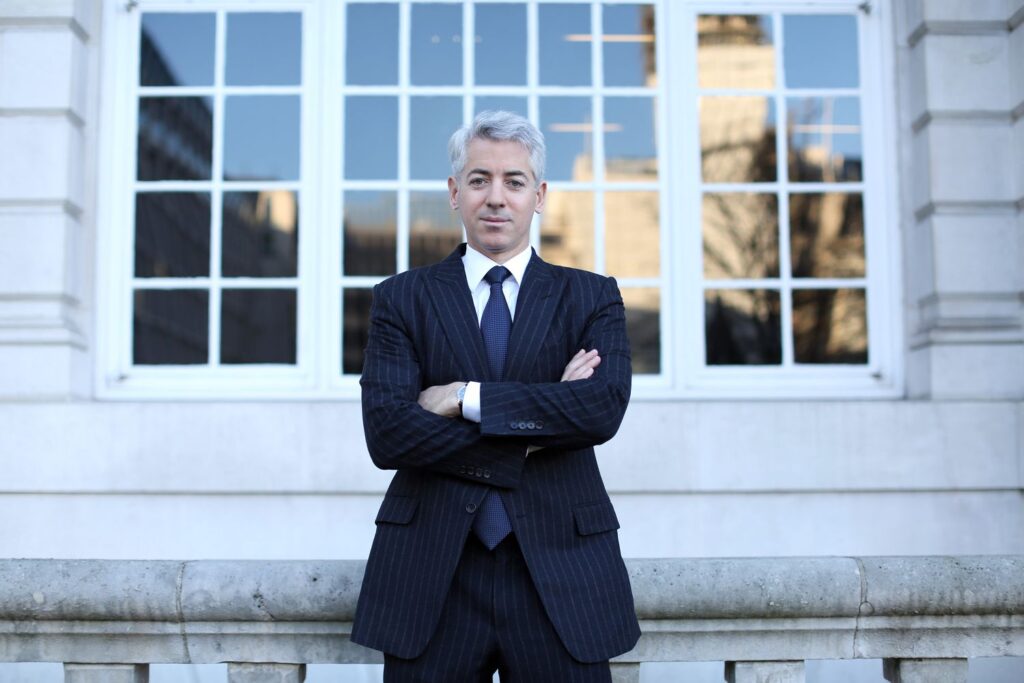key takeaways
- The bulk of Bill Ackman’s Pershing Square portfolios hold only 8 to 12 core holdings, reflecting high investment conviction.
- Ackman is known as an activist investor, but now tends to focus on investments with long-term value and durable business quality.
- Pershing Squares’ transparency and actions help Ackman build a public profile comparable to that of Buffett.
Warren Buffett, the 95-year-old financial magnate and “Oracle of Omaha,” recently announced he’d be stepping down from his role as CEO of Berkshire Hathaway by the end of 2025. Now eyes are turning toward successful hedge fund managers who share his ambition for long-term value creation. Among them, Bill Ackman, the 59-year-old founder and CEO of investment adviser Pershing Square Capital Management (PSCM), with $19.652 billion under management on a discretionary as well as nondiscretionary basis as of May, is increasingly seen not just as an investor, but as someone attempting to build a legacy reminiscent of Buffett’s.
From his bold activist investment bets earlier in his career to the way he’s building his company today, Ackman’s strategy has Wall Street asking: Could he be the next Buffett in terms of sustained investment outperformance?
Concentrated Portfolios With High Conviction
Both Ackman and Buffett manage portfolios that reflect a high-conviction, concentrated investment approach.
Ackman’s Pershing Square Holdings, Ltd. is an investment holding company that manages Pershing Square Holdings (PSH), a publicly traded closed-end fund, for which Pershing Square Capital Management is the investment advisor. He typically allocates the bulk of the company’s portfolio to 8 to 12 core holdings, mostly large-cap North American businesses.
This method mirrors Buffett’s approach. Despite its size, Berkshire Hathaway maintains big stakes in relatively few companies. For example, 21.8% of Berkshire Hathaway’s portfolio is made up of Apple Inc., while another 16.5% is made up of American Express Co. (holdings as of June 30, 2025, based on the company’s 13F SEC filing on August 14, 2025).
The idea is that fewer, deeply researched positions with strong concentration may outperform a widely diversified portfolio over time.
Long-Term Investment Horizon
Ackman and Buffett both favor a long time horizon in their major bets. Buffett is famous for buying with the intention of holding stocks “forever,” especially in companies with durable competitive advantages and trustworthy management. Meanwhile, Ackman is known for being an outspoken activist investor—making massive investments in a particular company and often becoming the largest shareholder of the business. Generally, his intention is to purchase a majority stake in a company with the intention of improving it.
One of Ackman’s most famous activist investments was his $1 billion short position against the herbal supplement company Herbalife back in 2012, alleging that the company was a pyramid scheme. After Ackman took his position, the U.S. Federal Trade Commission took notice and investigated the matter further. Herbalife settled with the government, incurring a $200 million penalty and requirements to reform its business practices. However, while Ackman brought light to this issue, he lost money in the end.
Today, Pershing Square’s interests lie primarily in companies like Amazon, Google, Chipotle, Brookfield, and Howard Hughes Holdings, signaling a shift toward sustained ownership in durable companies and less transient positioning.
Business Quality and Moat-Focused Investing
Both investors seek businesses with strong economic moats—competitive advantages that protect profits over time. According to Pershing Square, Ackman aims to invest in “high-quality growth businesses … that generate predictable, recurring cash flows.”
While Ackman’s sector exposure can vary—currently leaning toward consumer brands, tech, restaurants, and real estate—his criteria closely resemble what have historically made Buffett’s investments successful: durable brands and capital discipline.
Transparency and Public Influence
Buffett has long set the standard for investor communication through his annual Berkshire Hathaway shareholder letters, which openly discuss performance, mistakes, and his long-term outlook. These letters are generally considered essential reading on Wall Street and have shaped expectations for transparency from Berkshire Hathaway investors.
At the same time, Ackman has adopted a similar playbook. Through consistent press releases and regular investor updates, Pershing Square communicates strategy and rationale to shareholders, including investor presentations, annual reports, and financial statements.
Structural and Strategic Differences
- Despite the similarities between Berkshire Hathaway and Pershing Square, the two firms differ in a few important ways:
- Structure: Berkshire Hathaway is a holding company owning some whole businesses and large equity stakes in others; Pershing Square manages a publicly listed and traded fund primarily invested in public equities.
- Activism: Ackman has previously taken activist positions, pushing for change at companies like Herbalife, for example. Buffett prefers to buy businesses with a durable competitive advantage and tends to take a longer-term approach to investing.
- Scale and Scope: Berkshire Hathaway’s size allows for the acquisition of private companies; Pershing Square’s model works through publicly traded equities.
The Bottom Line
Bill Ackman shows many of the qualities people admire in Warren Buffett: conviction, a focus on business quality, and a willingness to hold concentrated positions in companies. But while echoes of Buffett are evident, Ackman plays in a different league in terms of activism and business structure. Whether he becomes the next Buffett isn’t certain—but one thing is clear: his moves are worth watching.
